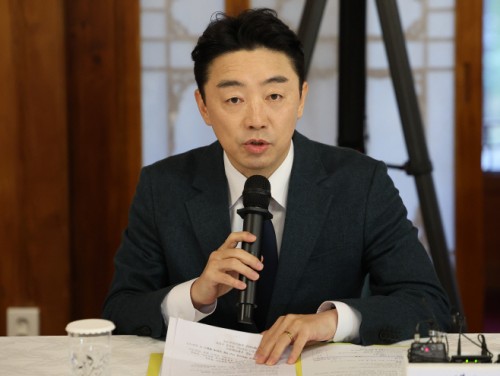 |
| Presidential Chief of Staff Kang Hoon-sik speaks during a high-level party-government policy meeting at the prime minister’s residence in Jongno, Seoul, on November 9. / Source: Yonhap News |
Presidential Chief of Staff Kang Hoon-sik on Monday urged stronger fiscal accountability from local governments in developing regional airports, effectively putting the brakes on what he called “indiscriminate” expansion projects.
At a senior aides’ meeting earlier in the day, Kang directed officials to “report plans to improve cost-sharing between central and local governments so that regional airports can only be pursued when local authorities bear clear responsibility,” according to Deputy Presidential Spokesperson Ahn Gwi-ryeong.
Kang also ordered related ministries to work on “enhancing the profitability of currently operating local airports.”
Among South Korea’s 15 airports excluding Incheon International Airport, nine recorded deficits last year. As airport construction and operations are funded entirely by the central government, such losses are ultimately covered by taxpayers. Kang’s comments were widely interpreted as a call to rationalize and streamline the regional airport system.
Referring to findings from the recently concluded parliamentary audit, Kang instructed ministries to “promptly adopt policy proposals that can improve citizens’ quality of life and reduce wasteful spending.”
He cited concerns such as the high rate of farmworkers’ deaths during agricultural work—three times higher than industrial workplace fatalities—and the rapid increase in taxpayer-funded official residences for local governments, which rose by more than 140 over the past five years at a cost exceeding 100 billion won. “These are issues the government must take to heart,” he said.
Kang also addressed growing public dissatisfaction with highway rest areas, where operators often collect commissions of up to 40% in what he described as a monopolistic environment. He noted reports of favoritism involving former officials of the Korea Expressway Corporation participating in rest-area management.
“The Korea Expressway Corporation and its affiliates must expand directly managed rest areas to ensure public benefit,” Kang said. “The overall operating structure must be fundamentally reformed with the public interest as the top priority.”
He further instructed the Ministry of Land, Infrastructure and Transport and the Fair Trade Commission to explore ways to transform expressway rest areas into a new K-tourism attraction.
Most Read
-
1
-
2
-
3
-
4
-
5
-
6
-
7





















